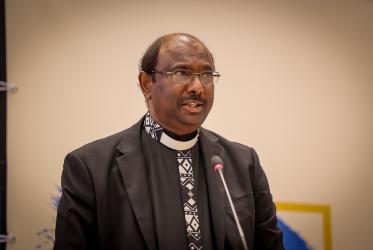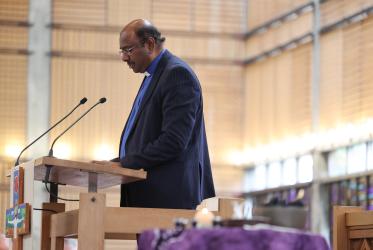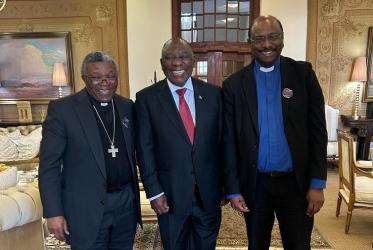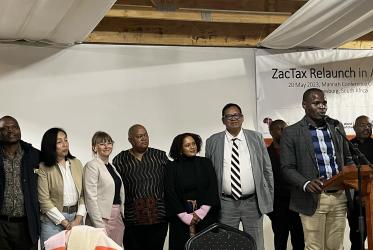Uniting Reformed Church in Southern Africa
In 1994 the Uniting Reformed Church in Southern Africa (URCSA) was established through the union of the former Dutch Reformed Mission Church (DRMC) and the Dutch Reformed Church in Africa (DRCA). Both churches were the fruit of the mission work done by the Dutch Reformed Church in South Africa. Shortly after their arrival in 1652 the Dutch introduced slavery in the Cape and started a slave school to further the Christian religion, Dutch language and culture. The Dutch Reformed Church (DRC) of the time had no organized mission activity and accommodated all racial groups. The baptism of slaves was left to the will of their masters. Very few baptized slaves were however confirmed as members of the church. In due course various mission organizations from abroad started working in South Africa, which led to a number of denominations amongst the indigenous people and slaves. This motivated the DRC to start its own independent mission work in 1824. Although the 1829 synod formally rejected discrimination on the basis of skin colour, in practice people of colour were discriminated against, particularly at worship services and holy communion. The synod of 1857 decided to allow separate services for coloured members "because of the weakness of some". The next logical step was the formation in 1881 of the DRMC as a separate church for the converts of the DRC's mission work. In each province of South Africa separate churches for blacks and coloureds were formed. All the coloured congregations eventually joined the DRMC, and the black churches the DRCA. Both remained under the control of the DRC for decades.
In 1966 the DRMC decided in favour of structural unity between the churches of the DRC family. The DRCA put a similar emphasis on unification in 1975. It took another 19 years for that ideal to be partially fulfilled. The DRC did not join the union of the DRMC and the DRCA. The name of the URCSA (in the continuous tense) and its logo (an incomplete circle) reflect the church's emphasis on and hope for the re-unification of the DRC family and the wider family of God.
In the process of unification, the Confession of Belhar with its strong emphasis on unity, reconciliation and justice was adopted in 1986 by the DRMC. This is very much the motivating power by which the URCSA lives. In addition, URCSA's confessional bases are the Apostles', Nicene and Athanasian Creeds, with the Canons of Dordt, the Confession Belgica and the Heidelberg Catechism. As a community of believers who are called together by the word of God and by his Holy Spirit, those who form the Uniting Reformed Church in Southern Africa are part of the church of Jesus Christ. Their mission is to effect the renewal of creation through the proclamation and witness of the kingdom of God as co-workers and followers of Christ through the power of the Holy Spirit.
The URCSA is divided into seven regional synods, including Namibia and Lesotho. Congregations are grouped together in presbyteries. The general synod determines the church's policy, and the regional synods reflect these policies in their various activities. URCSA's witness to humankind and the world is primarily expressed through its congregations. The congregation serves God, by witnessing and fighting against all forms of injustice; by calling upon the government and the authorities to serve all the inhabitants of the country, by allowing justice to prevail. URCSA's vision is "Dynamic in Unity, Reconciliation and Justice".





